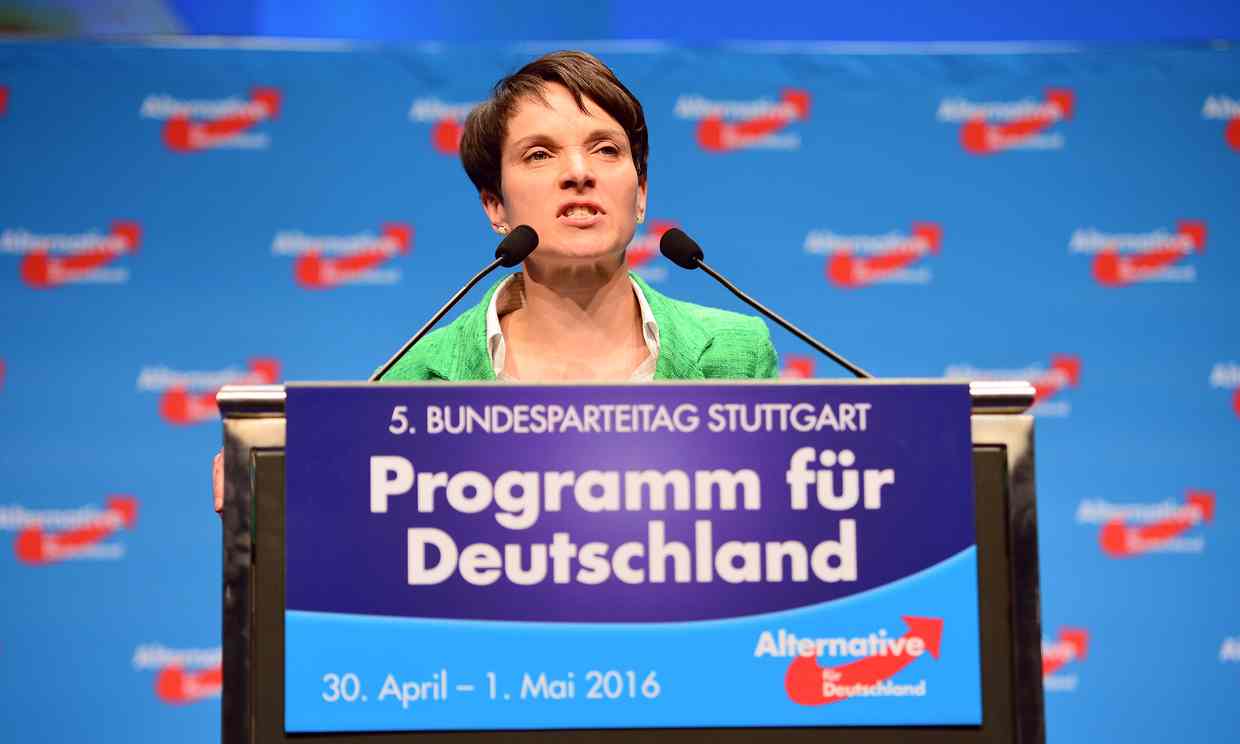German far-right party calls for ban on minarets and burqa
by The Guardian, May 2. 2016.
 |
Alternative für Deutschland
conference says Islam is not compatible with Germany’s constitution
Delegates from Germany’s
anti-immigration party Alternative
für Deutschland (AfD) backed
an election manifesto on Sunday that says Islam is not compatible
with the country’s constitution and calls for a ban on minarets and
the burqa.
The AfD was set up three years ago and
has been buoyed by Europe’s migration crisis and the arrival of
more than a million mostly Muslim migrants in Germany last year.
The
party has no presence in the federal parliament in Berlin but has
members
in half of Germany’s 16 regional state assemblies.
Opinion polls give AfD support of up
to 14%, presenting a serious challenge to Angela Merkel’s
conservatives and other established parties in the run-up to the 2017
federal election.
Other parties have ruled out a coalition with the
AfD.
In a raucous and highly emotional
debate on the second day of a party congress, many of the 2,000
delegates cheered calls from the podium for measures against “Islamic
symbols of power” and jeered a plea for dialogue with Germany’s
Muslims.
“Islam is foreign to us and for that
reason it cannot invoke the principle of religious freedom to the
same degree as Christianity,” Hans-Thomas Tillschneider, an AfD
politician from the state of Saxony-Anhalt, said to loud applause.
Merkel has said on many occasions that
freedom of religion is guaranteed by Germany’s constitution and
that Islam is welcome in the country.
As many as 2,000 leftwing
demonstrators
clashed with police on Saturday as they tried to disrupt the AfD
conference. About 500 people were briefly detained and 10 police
officers were slightly injured, a police spokesman said.
The chapter of the AfD manifesto
concerning Muslims is titled “Islam is not a part of Germany”.
In Sunday’s debate, one delegate’s
call for greater understanding drew jeers and loud whistles.
“I call for a differentiation and
urge everybody to visit their local Muslim communities and initiate a
dialogue,” said Ernst-August Roettger, a delegate from the northern
city of Lüneburg.
He was speaking in support of an
amendment that called for acceptance of everybody’s religious
freedom and for the party not to regard all Muslims as extremists.
Delegates rejected the amendment.
Germany
is home to nearly four million Muslims, who make up about 5% of the
population.
Many of the longer established communities came from
Turkey to find work, but those who have arrived over the past year
have mostly been fleeing conflicts in Syria, Iraq and Afghanistan.
Last month the head of Germany’s
Central Council of Muslims likened the AfD’s attitude towards his
community to that of Adolf Hitler’s Nazis towards the Jews.


